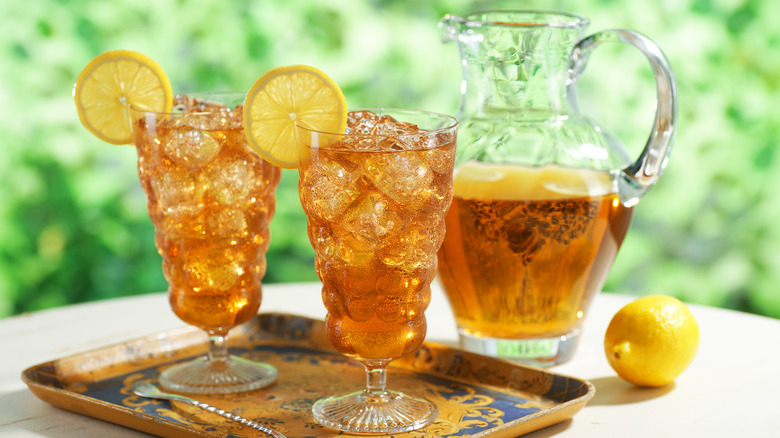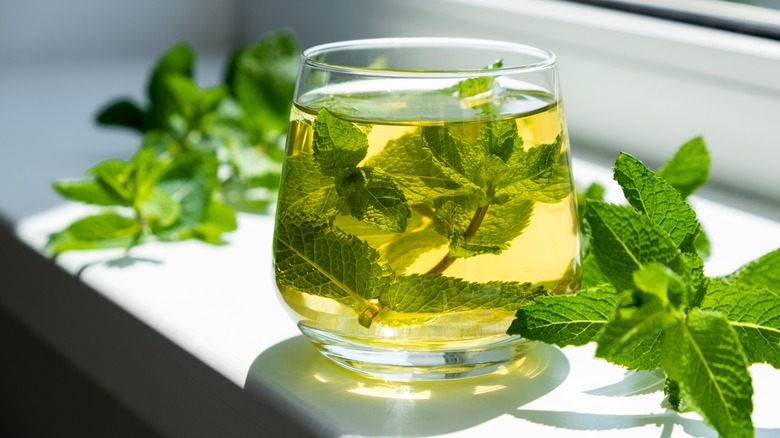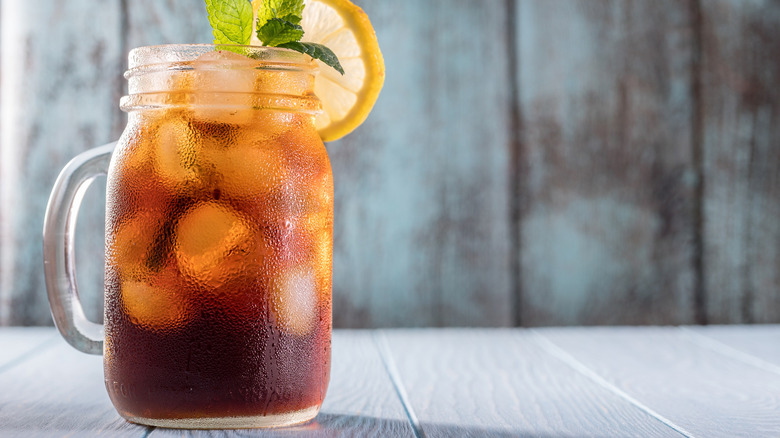Why Hot-Brewed Iced Tea Is Far Superior To Slower Cold Brew
On a lazy summer day, under parching hot sun, there are few drinks more refreshing than a tall, frosty glass of iced tea. Poured over ice, this invigorating drink carries a delightful balance of flavors; the dry taste of the tea works best offset with a little sweetness, a pinch of sharpness from a dash of lemon juice, and perhaps a hint of a brighter flavor like mint. It's a healthy choice, too, with a study published by the European Journal of Nutrition suggesting that drinking black tea could help boost your metabolism. The big question, though, is how best to brew your iced tea — hot brew or cold brew?
The classic ingredient for the iced tea enjoyed across the U.S. is black tea, which is best brewed with hot water. Not too hot, though. Most tea enthusiasts will tell you that black tea should be made with water that's not quite boiling, ideally around 200 degrees Fahrenheit. This is to ensure that the tea properly infuses, imparting its dense flavors into the water. With water that's too hot, too many tannins will leach out from the tea leaves, running the risk of making your tea too bitter. This is the traditional way to brew black tea, and it's been enjoyed this way in China for centuries. If you're making iced tea with black tea, this is hands down the best way to enjoy its full depths of flavor. That said, this isn't the only way to brew tea.
Hot brew vs cold brew
Just like coffee, tea can be cold brewed. Also, like coffee, this method takes a lot longer. Making cold-brew iced tea involves leaving it for around 8-10 hours to infuse properly to make sure the tea has enough flavor. You can also make cold-brew black tea this way, but green teas are better suited to this method of brewing. The secret to making delicious tea lies in the water, and a mistake many people make with green tea is to brew it too hot. With its subtler flavors, green tea is best brewed at around 140 to 185 degrees Fahrenheit — if you've ever heard someone say they tried green tea but thought it tasted "grassy," it's usually because it was brewed too hot. Too many tannins will damage the flavor of green tea, and brewing with cooler water avoids this.
Cold-brewed tea will have minimal tannins, giving a very different flavor profile, sweeter and smoother with much less astringency. For green tea, this lets the more subtle flavors shine through without being overpowered. Being milder tasting, iced green tea can benefit from having some astringency added, which is why iced green tea with lime and plenty of mint is such a good combination. Anyone who's used to the drier, more robust taste of black tea, though, may find that cold brewing leaves it lacking something. For a bolder flavor, hot brewing is the best choice for black tea, even when iced.
Hot brewed tea has a richer flavor
There are a variety of black teas that work very nicely in iced tea, like Assam, Darjeeling, or Earl Grey. Each of these has its own nuances and subtleties of flavor, and they'll all benefit greatly from hot water to bring out their astringent depths. There are a few other options, too, like oolong tea or even more robust green teas like gunpowder tea. A good rule is that any tea with dense flavors is best brewed hot. For iced tea, this is the best way to get the taste just right.
The other huge benefit of hot brewing tea is that it's much faster. When making iced tea, you'll still need to wait a while for it to cool, but it's still quicker than waiting overnight for a cold brew to infuse. If you're impatient or thirsty though, there's one trick to easily speed up the cooling process. Simply pour your brewed tea into a pitcher and immerse it in a sink full of cold or iced water. Stir it occasionally to ensure it cools evenly, and your tea should be ready to drink in a couple of hours. Then, your only choice is how you serve it. Why not try one of these refreshing iced tea recipes to mix things up a little?


